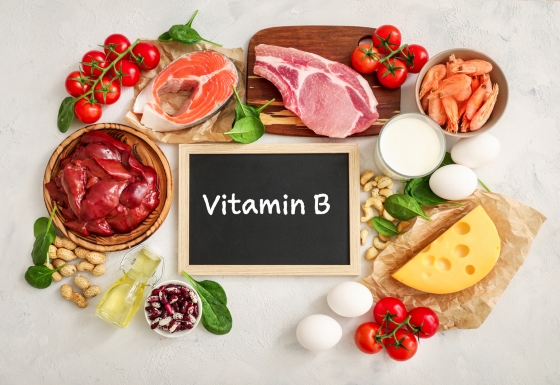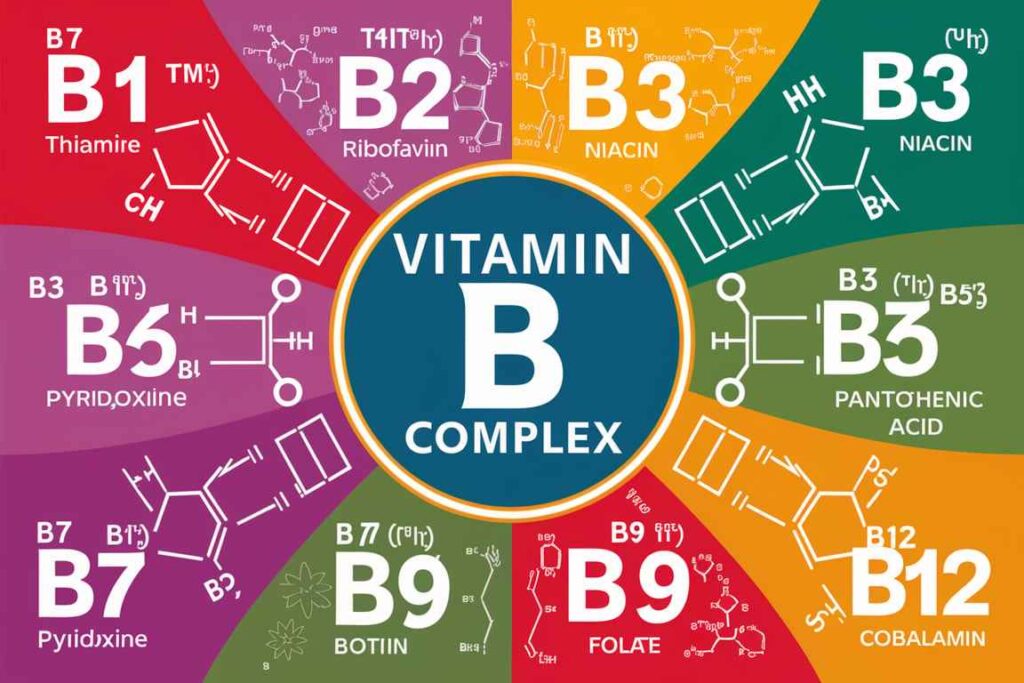When it comes to maintaining energy, supporting metabolism, and protecting the nervous system, Vitamin B complex is an essential group of nutrients you don’t want to overlook. Often called the “energy vitamins,” these eight water-soluble vitamins work together to support nearly every function in the body—from producing red blood cells to breaking down carbohydrates.
In this post, we’ll explore the roles of each B vitamin, where to find them in food, and why they’re important for your overall health.
🧬 What Is Vitamin B Complex?
Vitamin B complex refers to eight different B vitamins, each with a unique role in the body:
- B1 – Thiamine
- B2 – Riboflavin
- B3 – Niacin
- B5 – Pantothenic Acid
- B6 – Pyridoxine
- B7 – Biotin
- B9 – Folate (Folic Acid in supplements)
- B12 – Cobalamin
These vitamins are water-soluble, meaning your body doesn’t store them long-term. You need a regular intake through food or supplements.
⚙️ Role of Each B Vitamin in the Body
1. B1 (Thiamine)
- Converts carbohydrates into energy
- Supports nerve function and muscle contraction
- Important for heart health
2. B2 (Riboflavin)
- Helps break down fats, proteins, and carbohydrates
- Supports skin, eye, and nerve health
- Works as an antioxidant
3. B3 (Niacin)
- Aids in energy production and DNA repair
- Supports skin health and nervous system
- Can help lower LDL (bad) cholesterol levels
4. B5 (Pantothenic Acid)
- Essential for making fatty acids and hormones
- Supports wound healing
- Helps with energy metabolism
5. B6 (Pyridoxine)
- Involved in amino acid metabolism
- Supports brain development and immune function
- Helps produce neurotransmitters (like serotonin)
6. B7 (Biotin)
- Known for healthy hair, skin, and nails
- Helps with carbohydrate and fat metabolism
- Important during pregnancy for fetal development
7. B9 (Folate/Folic Acid)
- Vital for DNA synthesis and cell growth
- Crucial during pregnancy to prevent birth defects
- Supports red blood cell formation
8. B12 (Cobalamin)
- Essential for nerve function and red blood cell production
- Helps make DNA
- Deficiency can lead to fatigue, memory issues, or anemia
🥗 Natural Sources of Vitamin B Complex
To ensure a good intake, include a variety of these B-vitamin-rich foods in your diet:
| B Vitamin | Food Sources |
|---|---|
| B1 | Whole grains, pork, legumes, sunflower seeds |
| B2 | Dairy products, eggs, lean meats, green veggies |
| B3 | Chicken, tuna, peanuts, mushrooms, fortified cereals |
| B5 | Avocados, broccoli, sweet potatoes, eggs |
| B6 | Bananas, chickpeas, poultry, fortified cereals |
| B7 | Egg yolks, nuts, seeds, salmon, spinach |
| B9 | Leafy greens, lentils, citrus fruits, fortified grains |
| B12 | Meat, fish, dairy, eggs, fortified plant-based milks (for vegans) |
💡 Note: B12 is only naturally found in animal products. Vegans and some vegetarians may need to supplement.
💊 Who Might Need a Vitamin B Complex Supplement?
You may benefit from a B-complex supplement if you:
- Are vegan or vegetarian (risk of B12 deficiency)
- Are pregnant or trying to conceive (need more folate)
- Have digestive disorders (like celiac or Crohn’s disease)
- Are over 50 years old (less efficient B12 absorption)
- Consume excessive alcohol, which impairs B absorption
- Have high stress levels or fatigue
- Take medications like birth control pills or metformin
⚠️ Signs of B Vitamin Deficiency
Common symptoms include:
- Fatigue or weakness
- Irritability or mood swings
- Brain fog or poor memory
- Cracked lips or mouth sores
- Tingling in hands and feet
- Hair thinning or brittle nails
- Anemia (B12 or B9 deficiency)
If you notice these symptoms, consult a healthcare provider before starting any supplement.
🧠 Summary: Why Vitamin B Complex Matters
The B vitamins are small but mighty. Together, they:
- Fuel your cells with energy
- Support brain, heart, and immune health
- Help form red blood cells and DNA
- Improve stress response and mental clarity
A balanced diet rich in whole foods usually provides enough B vitamins. However, certain people may need to supplement to meet their needs.

Final Tip: Always choose a high-quality B-complex supplement with active forms (like methylfolate and methylcobalamin) for better absorption—and consult a doctor before beginning any supplement routine.
Have you tried a B-complex supplement or noticed a difference in energy or mood?
Share your experience in the comments below!

